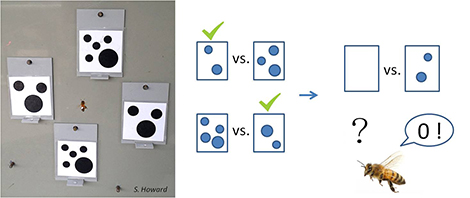Global S&T Development Trend Analysis Platform of Resources and Environment
| Bees and the thought of naught | |
| admin | |
| 2018-06-07 | |
| 发布年 | 2018 |
| 语种 | 英语 |
| 国家 | 法国 |
| 领域 | 地球科学 |
| 正文(英文) | Honeybees can conceive and interpret zero. This has just been demonstrated by a scientist from the Research Centre on Animal Cognition (CNRS / Université Toulouse IIIPaul Sabatier) and her Australian colleagues, proving for the first time ever that insects are capable of mathematical abstraction. As zero, designating nothingness, neutrality, or absence, is a relatively recent concept for humans, these findingspublished in Science (June 8, 2018)raise questions about its symbolic significance in the history of mathematics.Though some vertebrates had already been shown to master complex numerical concepts like addition and zero, no evidence of this existed for insects. Since bees can count to five at least, the researchers taught them the inequality relations greater than and less than. First they trained them to drink sweetened water from an experimental setup where platforms were paired with images. Their task was simply to choose the image depicting the smallest number of elements. If they selected the correct one, they were rewarded with sweetened water. Otherwise, they got bitter quinine solution. Once the bees grasped the exercise, the researchers showed them two images at a time: one was blank (representing zero) and another had one or more dots (representing a whole number). The insects selected the blank image as representing the least number of elements. This shows they had extrapolated their understanding of less thanas applied to whole numbers (1, 2, 3, 4, or 5)to zero, which they assigned the lowest rank of all. Bees have only a million neurons (100,000 times fewer than humans), yet both species can grasp zero. Zero was a major mathematical breakthrough for humans and is a particularly abstract concept. We can use this symbol of nothing to designate the absence of objects, while manipulating it as if it represented a quantity. The brain, which evolved to process sensory stimuli, can also perceive the absence of stimuli as a construct itself. By suggesting that the concept of zero is useful even to pollinating insects, the scientists' discovery invites inquiry into its symbolic importance more generally.
 © Scarlett Howard & Aurore Avarguès-Weber After learning that images depicting the fewest number of elements were matched with rewards, bees chose the blank image. This experiment demonstrates that these insects consider zero, the empty set, to be less than any whole number. 
Bibliography:Howard SR, Avarguès-Weber A, Garcia J, Greentree A, Dyer AG. Bees extrapolate ordered relations to place numerosity zero on a numerical continuum. Science. 2018. doi:10.1126/science.aar4975. Contacts: CNRS researcher l Aurore Avarguès-Weber l aurore.avargues-weber@univ-tlse3.fr |
| URL | 查看原文 |
| 来源平台 | Centre national de la recherche scientifique |
| 文献类型 | 新闻 |
| 条目标识符 | http://119.78.100.173/C666/handle/2XK7JSWQ/106991 |
| 专题 | 地球科学 |
| 推荐引用方式 GB/T 7714 | admin. Bees and the thought of naught. 2018. |
| 条目包含的文件 | 条目无相关文件。 | |||||
| 个性服务 |
| 推荐该条目 |
| 保存到收藏夹 |
| 查看访问统计 |
| 导出为Endnote文件 |
| 谷歌学术 |
| 谷歌学术中相似的文章 |
| [admin]的文章 |
| 百度学术 |
| 百度学术中相似的文章 |
| [admin]的文章 |
| 必应学术 |
| 必应学术中相似的文章 |
| [admin]的文章 |
| 相关权益政策 |
| 暂无数据 |
| 收藏/分享 |
除非特别说明,本系统中所有内容都受版权保护,并保留所有权利。
修改评论